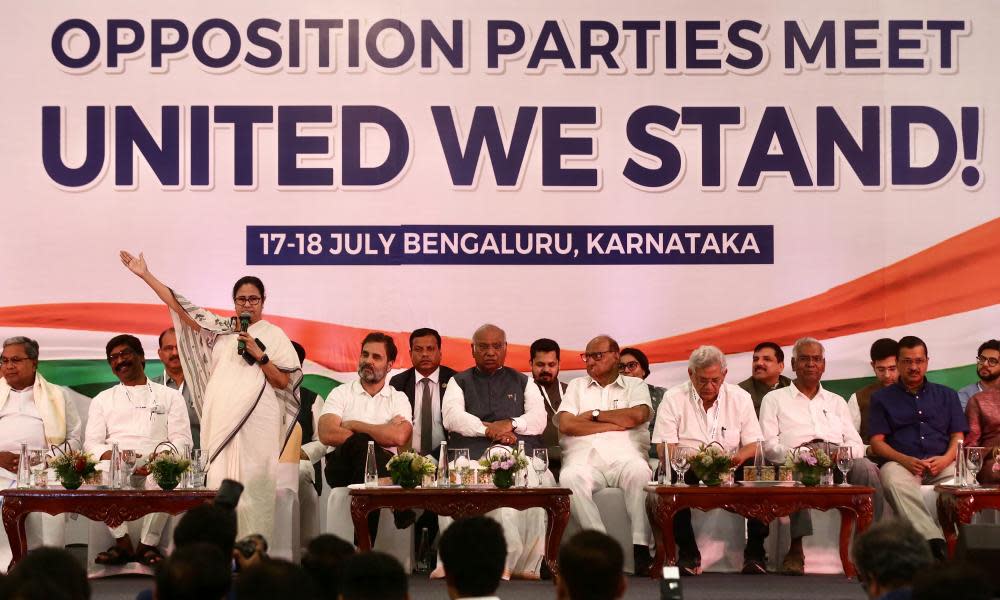Indian opposition unites in attempt to oust Narendra Modi

Leaders of 26 opposition political parties in India have united to form an alliance in an attempt to oust the country’s populist prime minister, Narendra Modi, in next year’s general election.
During a conclave of opposition parties held this week, it was decided that the coalition will be called the Indian National Developmental Inclusive Alliance: otherwise known as India.
The meeting of the leaders marked a significant step forward in the relationship between the country’s main national and regional opposition parties, who have previously struggled to unite due to power struggles, personality clashes and ideological differences.
However, a consensus was reached earlier this year that unless they formed a united front, no single party stood a viable chance against Modi and his Bharatiya Janata party (BJP) government, which will be seeking a third term in the election, to be held in May 2024.
Included in the coalition are India’s largest national opposition, the Congress party, as well as powerful regional parties such as Trinamool Congress, which governs the state of West Bengal under the popular chief minister, Mamata Banerjee, and the Aam Aadmi party, which governs Delhi and Punjab.
“This was a very important meeting to save democracy and the constitution in the interest of the people of the country,” Mallikarjun Kharge, the president of the Congress party, told reporters.
Kharge emphasised that, unlike in the past, Congress would not be asserting its dominance in the opposition alliance and was not interested in the prime ministerial post.
In a document drawn up at the leaders’ meeting, which was held in Bengalaru in the southern state of Karnataka, the India coalition said it had “come together to defeat the hatred and violence being manufactured against minorities” under the Hindu nationalist politics of the BJP government.
A full election strategy will be decided by the coalition at meetings due to be held over the next few months but its tagline will be “Jeetega Bharat”, meaning “India will win”.
Even as a united alliance, the opposition parties face an uphill battle in taking on Modi, who still commands huge popularity across India, even among voters who do not consider themselves supporters of the BJP’s politics on a state level.
Between the 26 parties, the alliance governs 11 states while the BJP governs 15. The BJP also holds an overwhelming parliamentary majority after the 2019 election, in which it won 303 seats out of 543.
During his nine years in power, Modi has consolidated his power as prime minister, while the opposition parties have been the targets of raids and investigations by state agencies and several opposition leaders have been jailed, which has systematically weakened the opposition.
The former leader of the Congress party, Rahul Gandhi, who lost the last two elections to Modi, was in March disqualified from parliament and from running in next year’s election, and sentenced to two years in jail, over a court case that critics alleged was politically motivated. Speaking at the opposition gathering, Gandhi said the election battle was between “Narendra Modi and India [the alliance], his ideology and India. India always wins all fights.”
While opposition parties such as Congress and Trinamool Congress have been emboldened by state election results in which they beat the BJP, overall the BJP’s funds, resources and power far outstretch those of any other political party.
On the same day as the coalition was announced, the BJP held a meeting of representatives from its own 38 political allies. Modi launched a scathing attack on their alliance, calling it a “hardcore corruption convention”. He added that “alliances built on negativity have never won”.

 Yahoo News
Yahoo News 
